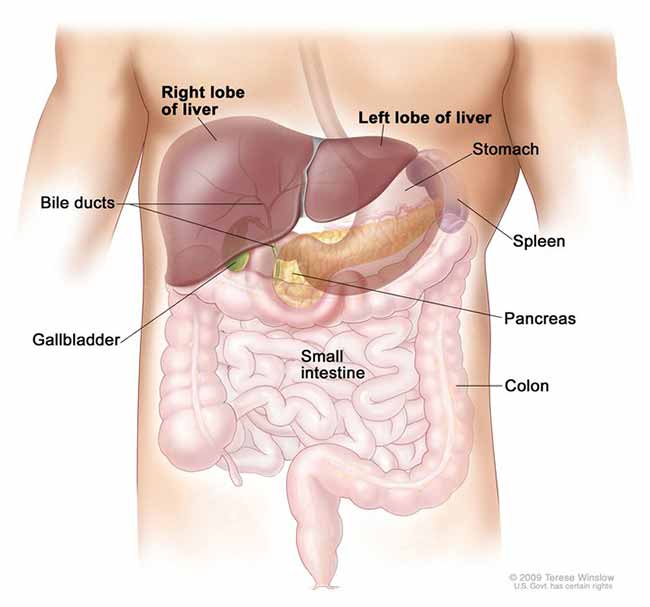TCGA study of liver cancer reveals potential targets for therapy
- Posted: June 15, 2017
Contact:
NCI Press Office
301-496-6641
A comprehensive analysis of hepatocellular carcinoma (HCC), the most common type of liver cancer, has revealed several genomic changes that may represent new therapeutic targets. The incidence of HCC has risen over the last 20 years and currently has a poor 5-year overall survival rate of approximately 15 percent. There are several known risk factors for HCC, including hepatitis B virus (HBV) and hepatitis C virus (HCV) infection, diabetes mellitus, obesity, and alcohol abuse. Currently only two drugs, the receptor tyrosine kinase inhibitors sorafenib and regorafenib, are approved by the Food and Drug Administration for treating advanced HCC. In part to increase the number of potential therapeutic targets, investigators from The Cancer Genome Atlas (TCGA) Research Network identified genomic alterations in 196 tumors that influence development of HCC, including mutations in the TERT gene promotor, mutations in the TP53 and CTNNB1 (β-catenin) genes, and elevated expression of several immune checkpoint genes.
TERT promotor mutations were identified in 44 percent of the tumors studied. These mutations were associated with increased elongation of telomeres, protective tips on the ends of DNA strands that shorten with each cell division, ultimately limiting the number of times a cell can divide. The TERT promotor mutations were also strongly associated with silencing of the CDKN2A gene, a tumor suppressor gene whose protein product helps regulate the cell cycle. Together, these findings suggest that both alterations contribute to the immortality of HCC cells and that telomerase inhibitors, which are currently undergoing clinical testing, may help reverse this immortality. The TP53 gene, which is the most commonly mutated gene in cancer and encodes a tumor suppressor protein that also helps regulate the cell cycle, was mutated in 31 percent of the tumors studied, suggesting that these tumors may respond to targeted restoration of TP53 activity, a strategy currently under development. In addition, the researchers found that some tumors with normal TP53 genes exhibited low TP53 expression and overexpression of another gene, MDM4, whose protein product binds to TP53 protein and blocks its activity; small molecule inhibitors of MDM4 protein are currently available. Mutations in another significantly mutated gene, CTNNBB1, identified in 26 percent of the tumors studied, might be targeted with Wnt signaling pathway inhibitors, which are currently in development. Finally, 20 percent of HCC tumors had high levels of immune cells infiltrating the tumor and elevated expression of the immune checkpoint genes CTLA4, PD-1, and PD-L1. Given the recent success of immune checkpoint inhibitors in several cancer types, these therapies may be able to increase the responsiveness of a subset of HCCs to attack by the immune system. Findings from this TCGA Research Network study, led by David A. Wheeler, Ph.D., Baylor College of Medicine, Houston, may help inform future clinical trials aimed to improve the prognosis of this deadly disease. The analysis was published in Cell on June 15, 2017. The Cancer Genome Atlas Research Network is led by the National Cancer Institute (NCI) and the National Human Genome Research Institute, both parts of the National Institutes of Health.
























.png)











No hay comentarios:
Publicar un comentario